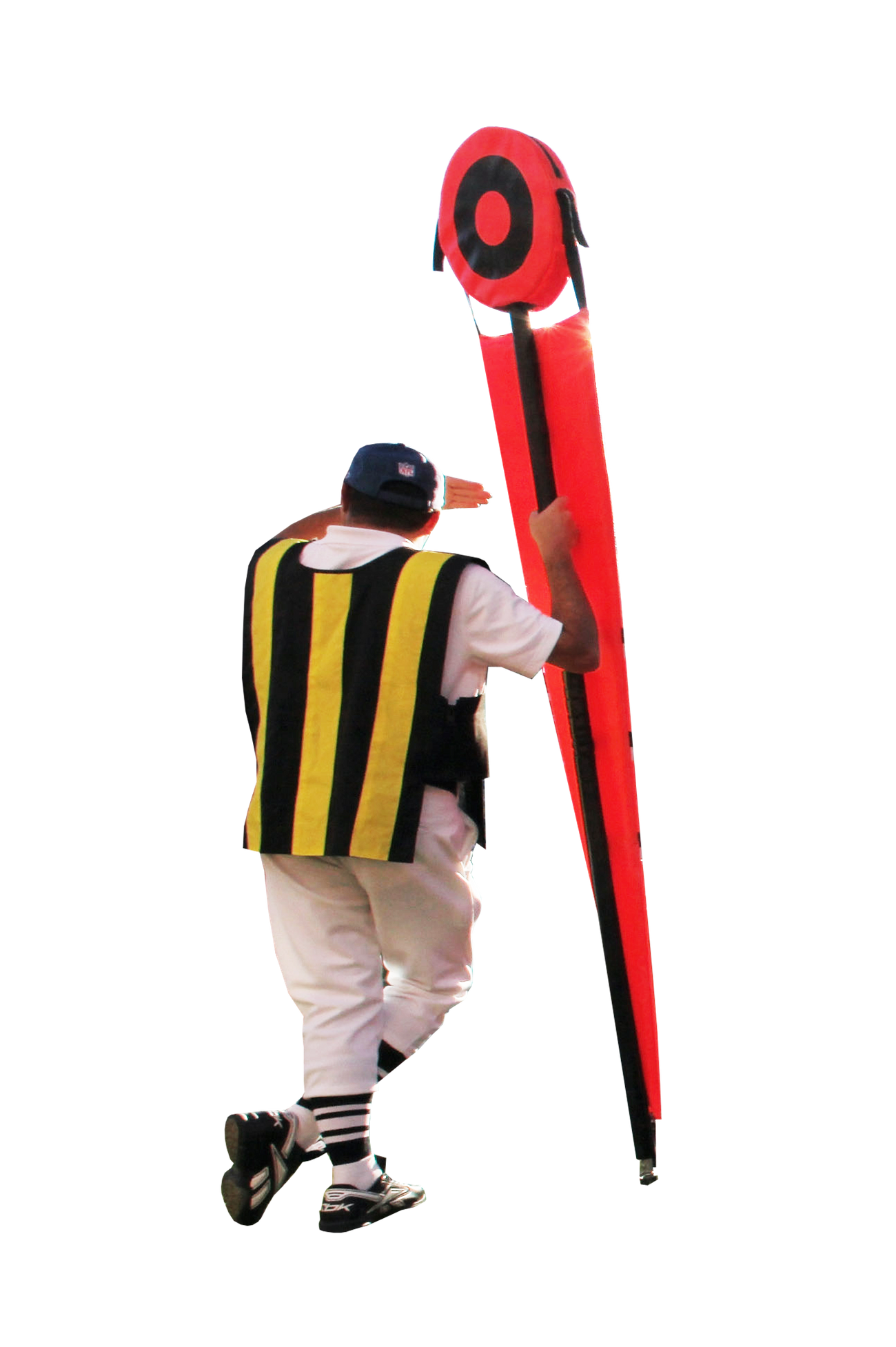Chained Melody
As Jews know, the greatest Super Bowl heroes aren’t the quarterbacks or the linebackers but the chain-movers




Most red-blooded Americans can name their favorite memory of the world’s biggest game. For some, it’s Giants receiver David Tyree, catching the ball against his head to make arguably the greatest catch in Super Bowl history and crushing the previously undefeated New England Patriots. For others, it’s Joe Namath leading the Jets to victory, a prospect many considered existentially impossible. Those less interested in the game itself still have their happy moments, like Katy Perry’s Left Shark, or Oreo’s award-winning tweet during 2013’s 49ers/Ravens blackout. These are all epic moments. But mine is very different: What I love best about the Super Bowl is the moment of chain-moving to mark the yards left until the next first down.
A practically invisible process rendered seemingly moot by the technologically rendered first-down markers that appear on our screens, chain-moving involves anonymous individuals schlepping actual metallic links yard by yard. While the game’s best players get their ritualistic jaunt to Disney World (well, maybe not this year), and pundits continually ponder whether 30-second ads can ever be worth $5 million, members of the NFL “chain gangs,” as they are called, pocket their $100 pay and then go back to their day jobs as IT workers, teachers, or firefighters. They aren’t cheered on. They aren’t yelled at. They aren’t even noticed, which is why Sports Illustrated, in a rare mention of chain-movers, called them “football’s ficus plants, those forgettable ornaments of sideline feng shui, forever lurking in the corner of your screen whenever the camera cuts to a coach.”
That’s all wrong. The chain-movers make the game possible. Without them, those helmeted gladiators would just stand there befuddled, unable to perform their feats of strength. The chain-movers are the real heroes of the game.
It’s a logic that we Jews should immediately recognize. Think, for example, of your last visit to shul. Who makes things tick? Not the rabbi, the cantor, or the president, but the men and women who show up early and make sure every seat has a prayer book and then stay late to collect the books and place them in a neat pile, the people who lovingly lay out the treats for kiddush everyone enjoys, the volunteers who take on all the tasks that are thoroughly mundane and absolutely necessary for communal life to function.
Look at Jewish history, and you’ll see that it’s the chain-movers we celebrate most. We don’t name our children after Herculean warriors or almighty emperors. We call them Ruth, after an ancient immigrant who extended a quiet act of kindness, or Judah, after a leader who had the courage to admit failure and fix it, or Isaac, after a son who knew the obligations involved in keeping a family together. None are extraordinary or larger than life; all are human beings who realized that for the game to continue, someone has to pick up the links and quietly move them along.
In his A Letter in the Scroll, Rabbi Lord Jonathan Sacks wrote a moving affirmation of Judaism’s chain-movers:
Our ancestors were Jews because their parents were Jews, and so were their parents, back across the centuries to ancient times. That is how Judaism and the Jewish people survived. In no small measure that is what it is to be a Jew—to inherit a faith from those who came before us, to live it, and to hand it on to those who will come after us. To be a Jew is to be a link in the chain of generations ... carry it and it will carry you.
Our tradition has long treasured those who pass things along. We still study the same Torah we received from Moses at Sinai, each generation passing it on to the next. We still chant its words in the same exact way because the Masorites, a largely anonymous group of scribes, ensured we’d all have a uniform way of pronouncing the Bible’s lines. We pray today using the same words our ancestors uttered in the time of the Temple; we know them because the chain-movers moved the links along and made Jewish life happen.
Though there will be no ESPN 30 for 30 documenting these unhighlighted individuals—the mikvah attendees wiping down the preparation room before the next visitor, the shul executive directors working weekends to ensure a socially distanced chair setup in the sanctuary, the furloughed JCC program directors still sharing divrei Torah on social media week in and week out, the volunteers dropping off challah on Fridays to homebound seniors, the rabbis keeping up with the endlessly shifting wedding regulations—these are the real people we should hail. “Each Jew knows how thoroughly ordinary he is,” Milton Himmelfarb wrote, “yet taken together we seem caught up in things great and inexplicable.”
David Tyree never caught another pass after his 2008 catch. Tom Brady’s epic comeback against the Falcons in 2017 was sandwiched by various iterations of crying Tom Brady. The Super Bowl’s “greatest moment ever” will be debated as long as there’s a game. But this year, as you grab another round, raise a l’chaim to the game’s traditional torchbearers since you know they will receive no standing ovation and be invited to exactly no talk shows to ask how it felt to do what they did. They will simply keep trudging along, bearing the weight proudly and quietly, step by step, yard by yard.
Rabbi Dr. Stuart Halpern is Senior Adviser to the Provost of Yeshiva University and Deputy Director of Y.U.’s Straus Center for Torah and Western Thought. His books include The Promise of Liberty: A Passover Haggada, which examines the Exodus story’s impact on the United States, Esther in America, Gleanings: Reflections on Ruth and Proclaim Liberty Throughout the Land: The Hebrew Bible in the United States.